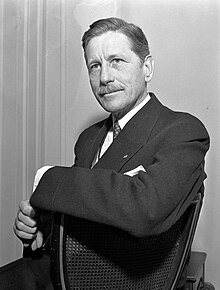
Back باتريك جيه هيرلي Arabic پاتریک جی. هورلئی AZB Patrick J. Hurley German Patrick J. Hurley Spanish Patrick J. Hurley French פטריק הארלי HE Patrick J. Hurley ID Patrick Jay Hurley Italian パトリック・ジェイ・ハーリー Japanese Хёрли, Патрик Russian

Patrick Jay Hurley (January 8, 1881 – July 30, 1963) was an American politician and diplomat. He was the United States Secretary of War from 1929 to 1933, but is best remembered for being Ambassador to China in 1945, during which he was instrumental in getting Joseph Stilwell recalled from China and replaced with the more diplomatic General Albert Coady Wedemeyer. A man of humble origins, Hurley's lack of what was considered to be a proper ambassadorial demeanor and mode of social interaction made professional diplomats scornful of him. He came to share pre-eminent army strategist Wedemeyer's view that the Chinese Communists could be defeated and America ought to commit to doing so even if it meant backing the Kuomintang and Chiang Kai-shek to the hilt. Frustrated, Hurley resigned as Ambassador to China in 1945, publicised his concerns about high-ranking members of the State Department, and alleged they believed that the Chinese Communists were not totalitarians and that America's priority was to avoid allying with a losing side in the civil war.
